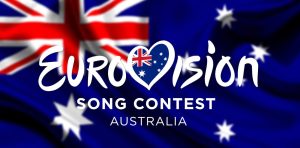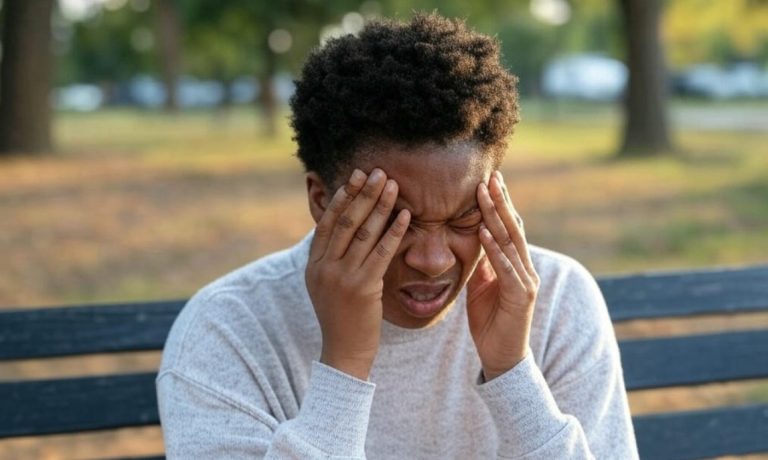In what might be one of the most surprising quirks in the world of international music competitions, Australia a nation located thousands of miles from Europe has been competing in the Eurovision Song Contest for the past decade.
As of 2025, Australia has become a recognisable and respected participant in what is technically a European broadcast event. For many casual viewers and fans alike, this raises an obvious and persistent question: Why is Australia in Eurovision?
With Go-Jo, the Australian entrant in 2025, preparing to perform Milkshake Man at the finals in Basel, Switzerland, interest in Australia’s participation has been renewed.
As we reflect on a decade of Australia’s presence in Eurovision, let’s delve into the origins of its involvement, the mechanics behind its eligibility, and what this might mean for the future of the contest.
How Did Australia Become Part of Eurovision?

Image – Source
The turning point in Australia’s Eurovision story came in 2015, but its journey began well before then. Australia has had a long-standing relationship with Eurovision, driven by its multicultural broadcaster, SBS (Special Broadcasting Service).
The contest was first aired in Australia in 1983, and over the years, it gained a cult following among Australians for its flamboyance, diversity, and cross-cultural celebration.
Early Engagement: From Viewer to Guest Performer
In 2013, during the Eurovision final held in Malmö, Sweden, Australia was featured in a pre-recorded video segment titled Greetings from Australia a tribute to the country’s 30 years of Eurovision broadcasts.
The following year, Australian pop star Jessica Mauboy performed during the interval of the second semi-final in Copenhagen, showcasing Australia’s growing cultural ties with the event.
These appearances laid the groundwork for the next step. In 2015, to mark the 60th anniversary of the Eurovision Song Contest, the European Broadcasting Union (EBU) extended a special invitation to Australia as a guest competitor. This decision was largely ceremonial but represented a major breakthrough.
Why Was Australia Invited to Compete?
The decision to allow Australia to compete in 2015 was both a tribute and a strategic move. Here’s what drove the inclusion:
- Celebration of Eurovision’s 60th Anniversary: Australia’s participation was meant as a one-time special event to honour the contest’s legacy and acknowledge Australia’s long-standing admiration for Eurovision.
- Recognition of Cultural Commitment: Australia had supported Eurovision through decades of enthusiastic broadcasting, commentary, and fan engagement. The SBS network helped popularise the contest to an extent that it became a celebrated annual event across the country.
- Testing Global Expansion: Inviting Australia allowed the EBU to test how non-European participation might work logistically and culturally, without compromising the contest’s core identity.
Australia’s 2015 entry, Guy Sebastian, performed Tonight Again, and achieved a strong 5th place finish. This warm reception, both from audiences and juries, proved that Australia could be a serious and respectful contender.
How Is Australia Eligible Under Eurovision Rules?

Image – Source
While the name Eurovision implies a European exclusivity, eligibility is determined not by geography but by broadcasting affiliation with the European Broadcasting Union.
The EBU consists of:
- Active Members: Primarily national broadcasters from the European Broadcasting Area (including parts of North Africa and the Middle East)
- Associate Members: Broadcasters from outside the official EBA, such as SBS in Australia
Though associate members typically cannot participate, exceptions have been granted under special circumstances. Australia’s SBS is one of the few associate members with such access, due to its:
- Continuous Eurovision broadcasts since 1983
- Culturally aligned programming and values
- Proven audience engagement and contribution to the Eurovision brand
This structure explains how non-European countries like Israel, Armenia, Azerbaijan, and Australia have found themselves competing in Eurovision over the years.
How Has Australia Performed in Eurovision?
Since debuting in 2015, Australia has participated every year except 2020 (when the contest was cancelled). The country has consistently qualified for the grand final, except in 2021 and 2024.
Australia’s Eurovision Performance Record
| Year | City | Artist | Song | Result |
| 2015 | Vienna | Guy Sebastian | Tonight Again | 5th |
| 2016 | Stockholm | Dami Im | Sound of Silence | 2nd |
| 2017 | Kyiv | Isaiah Firebrace | Don’t Come Easy | 9th |
| 2018 | Lisbon | Jessica Mauboy | We Got Love | 20th |
| 2019 | Tel Aviv | Kate Miller-Heidke | Zero Gravity | 9th |
| 2020 | Cancelled | — | — | — |
| 2021 | Rotterdam | Montaigne | Technicolour | Did not qualify |
| 2022 | Turin | Sheldon Riley | Not the Same | 15th |
| 2023 | Liverpool | Voyager | Promise | 9th |
| 2024 | Malmö | Electric Fields | One Milkali | Did not qualify |
| 2025 | Basel | Go-Jo | Milkshake Man | TBD |
Dami Im’s 2016 performance remains the country’s best result to date, finishing second overall and winning the jury vote.
What Happens If Australia Wins Eurovision?

Image – Source
While Australia is a full participant, hosting rights are not automatically granted. Eurovision traditionally requires the winning country to host the following year, but a win for Australia presents logistical challenges due to its time zone.
If Australia were to win:
- The contest would be hosted in a European city, not in Australia
- SBS would co-produce the event with a selected European broadcaster
- The show’s broadcast time would remain aligned with European schedules
This arrangement was agreed upon as part of Australia’s entry terms to ensure the continuity and accessibility of the contest across Europe.
What Role Does SBS Play in Sustaining Australia’s Eurovision Presence?
SBS is not just a broadcaster it’s the reason Australia is in Eurovision at all. Since 1983, SBS has committed significant resources to building Eurovision’s profile in Australia, including:
- Securing live broadcast rights every year
- Providing unique Australian commentary teams from 2001 onwards
- Producing national coverage, previews, and analysis
- Engaging audiences through online voting (where applicable) and promotional campaigns
The broadcaster’s vision of promoting diversity, multiculturalism, and international dialogue aligns closely with Eurovision’s values. This philosophical alignment has made SBS a natural partner for the EBU.
Has Australia’s Participation Changed Eurovision?

Image – Source
Australia’s presence in Eurovision is more than symbolic. It represents a broader trend of globalisation within European cultural events. Eurovision, originally designed to foster unity among war-torn European nations, has evolved into a modern, international celebration of music.
Australia’s inclusion has:
- Increased the contest’s visibility in the Asia-Pacific region
- Inspired discussions around expanding Eurovision formats (e.g., Eurovision Asia, American Song Contest)
- Challenged traditional notions of European identity and cultural borders
By proving itself both creatively and competitively, Australia has demonstrated that Eurovision can transcend geography while preserving its spirit.
Could Other Non-European Countries Join Eurovision?
Australia’s success has prompted speculation about the future inclusion of other associate EBU members. Countries like Kazakhstan, Canada, and even China have expressed interest or been involved in related events.
Potential Future Participants
| Country | Status | Notes |
| Kazakhstan | Junior Eurovision only | Participated from 2018 to 2020 |
| Canada | Associate EBU member | Strong cultural and musical links with Europe |
| United States | Spinoff (ASC) | Launched American Song Contest in 2022 |
| China | No formal role | Has shown interest in broadcast rights |
However, the EBU has indicated that such expansions would be handled cautiously, ensuring that Eurovision remains manageable, meaningful, and grounded in its mission.
What Does Australia’s Inclusion Mean for the Future of Eurovision?

Image – Source
Australia’s Eurovision journey has become a case study in how international enthusiasm can reshape regional traditions. It reflects a modern redefinition of cultural belonging one where values, not borders, determine participation.
This evolution doesn’t come without debate, but most Eurovision fans have welcomed Australia with open arms. Its artists have contributed fresh styles, high production values, and a deep respect for Eurovision’s traditions.
As Eurovision continues to evolve, Australia serves as both a symbol and a benchmark for what global inclusivity could look like in the world of music broadcasting.
ALSO READ:
FAQs About Australia’s Participation in Eurovision
Why is Australia allowed to compete in Eurovision?
Australia competes due to SBS’s status as an associate EBU member and its decades-long support and broadcast of the event.
Who is representing Australia at Eurovision 2025?
Go-Jo is representing Australia in 2025 with his track Milkshake Man.
Has Australia ever won Eurovision?
Not yet. Australia’s best result was in 2016 when Dami Im finished second.
Will Eurovision be hosted in Australia if it wins?
No. Due to time zone issues, the contest would be hosted in a European city with SBS as co-host.
Is Australia’s participation permanent?
Australia is invited on a year-by-year basis, though it has competed every year since 2015.
Has any other non-European country competed in Eurovision?
Yes. Israel, Azerbaijan, Armenia, and Morocco are among the non-European competitors.
What is the future of non-European countries in Eurovision?
While no new additions are confirmed, Australia’s success opens the door for potential future participants under special conditions.






